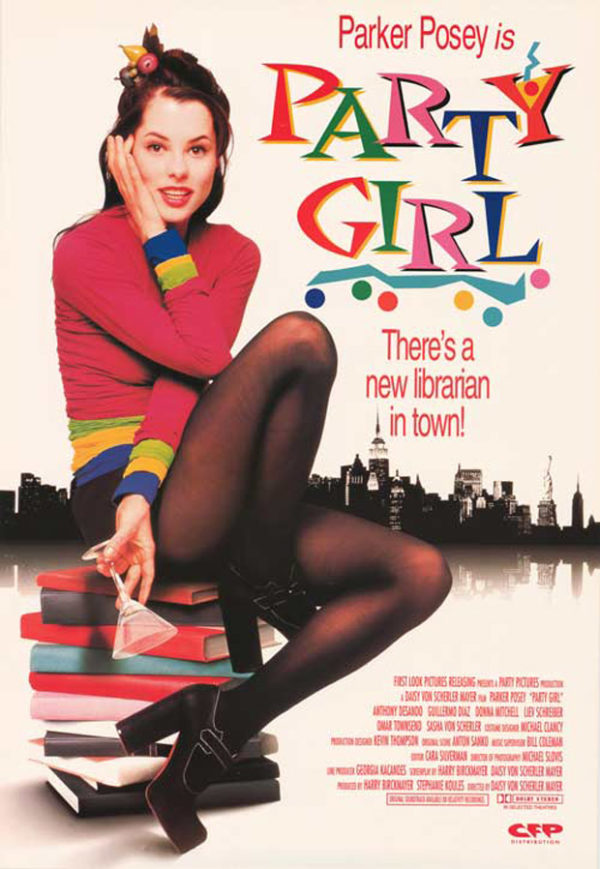
In my head, I have a list of movies that I know I haven’t seen and know I should. When I’m looking for something to watch, I don’t directly think about this list, but it’s always there, just in case I see something on it that tickles my fancy.
Sometimes that happens.
And sometimes I just come across something that should have been on that list but somehow wasn’t.
Party Girl wasn’t on my list. But, by all measures, it should have been.
It’s not a great movie, but it is definitely an artifact of its time and it definitely has some good performances in it. It’s also got a heavy nod to the early-mid 90s NYC club scene. Oh, and Parker Posey stars in it… which, right there, is enough that it should have been on my list.
The Plot
Mary (Posey) is the titular party girl. Out all night at the places to be seen and somehow still barely making ends meet. One bit of bad luck leads to another, though, and she finds herself in need of cash. She turns to the only family she’s got, her godmother Judy (Sasha von Scherler)… who just happens to work at the NY Public Library, which, conveniently, is short on clerks.
And so begins Mary’s stumbling story of self-discovery, finding love, and growing up.
Things are a bit disjointed. This is a movie from 1995 and it is a first production from the directory and writers. It has the earnestness of a crew trying hard, but just not quite having the skill (or the budget), to really pull of something that flows like an “A” list production.
In some cases, that awkwardness works for the story. In other cases, it doesn’t. Overall, it tells a good story and is chock full of interesting characters and some great moments (both story-wise and cinematography-wise.)
“She had no common sense.”
The major point of contrast in the story is between Mary’s life as a party girl and her budding professional interests. She’s in her 20s and having a bit of a crisis as her birthday approaches. It’s a situation a lot of people can relate to.
She’s got a bunch of friends, but they’re all mostly still struggling in some way or another. Her roommate is trying to make it as a DJ (and is lucky that Mary has an “in” at a local club). Her very-quickly-in-the-movie ex boyfriend, Nigel (one of Liev Schreiber’s early roles) is a bouncer at a club and a bit of a dick in general. Her new love interest, Mustafa, was a teacher in Lebanon, but now runs a struggling falafel cart.
Meanwhile, her godmother Judy is a solid librarian and the people she works with at the library (while not all that well developed, character-wise) are smart, decent people working steadily and living comfortably.
When she sees her goddaughter in need, Judy doesn’t exactly jump at the chance to help. Her regular refrain is that she knew Mary’s mother and that “she had no common sense.” She assumes Mary is “afflicted” in the same way.
Thing is, Mary comes to believe that, too.
Mary has a lot of reasons to doubt herself. She’s never actually succeeded at anything of note. She’s never really wanted to. She doesn’t stick with things. So when she starts working at the library and finally gives it a chance, she discovered much to her own surprise that not only does she enjoy the work, but she’s also kind of good at it.
The trick, as always, is taking that realization and making good use of it. As this is a comedy, it’s a rough road to that point. But, by the end, Mary gets there.
The Verdict
Honestly, this movie is hard to watch by today’s standards. It feels extra amateurish not just for being a first effort, but also because it is very 1990s. If there weren’t actual talent involved, particularly Posey, but also director Daisy von Scherler Mayer (who, all things considered, did a pretty good job… and has gone on to do some great TV directing), there’d be nothing of note about this.
If you sit through the film, you’ll be treated to some really great moments. They won’t always flow well from one point to another, some of them will feel like they come out of nowhere, some of them won’t really make sense (I swear there are some bits of this that were edited out of order or had some important lines from other scenes dropped), but they will be really good.
The first time Mary really decides to try at the library, staying all night to really learn the Dewey Decimal System and learn the layout of the place, it’s a great montage inter-cut with her roommate spinning for the first time at the club.
When Mary surprise re-organizes her DJ roommate’s record collection–right before he has to spin at the club–there’s a great scene with him freaking out (understandably so) and her trying to explain to him why and how it’s going to help.
Seeing Mary really bottom out when she makes one last grasp at turning “party” into her profession feels like it’s missing some important lead up, but in and of itself is a great sequence, especially when we get to see just how much of an asshole Nigel is.
This is one of those movies that I found interesting as a cultural artifact. It’s definitely a love letter to The Library and the NYC club scene, but it falls short of being iconic and endearing. I have doubts it would play as well without Posey in the lead.
If you’re curious, don’t hesitate to check it out. (It was also, apparently, the first movie to officially stream on the web… which alone makes it kind of an interesting piece of history.)

Leave a Reply